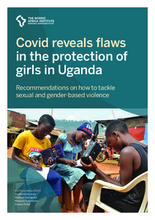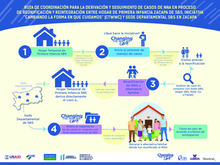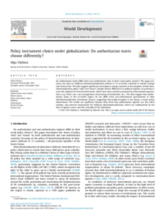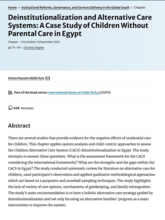Demographic Data:
|
Sources: World Bank, UNICEF, UNDP HDR 2015, DHS 2013/2014 |
Displaying 2131 - 2140 of 14348
Through 2020 and 2021, the COVID-19 pandemic led to prolonged school closures in Uganda. These closures exacerbated sexual and gender-based violence (SGBV) against girls.
This panel discussed coronavirus-associated caregiver loss and the work being done by the international community, the U.S. government, and faith-based actors to support vulnerable children and turn the tide toward better care. It was moderated by Gillian Huebner, executive director of the Georgetown University Collaborative on Global Children’s Issues.
Developed by Family for Every Child's Disability Working Group, the toolkit aims to strengthen the capacity of CSOs, social workers, service providers, government institutions and Members of the Family Alliance to include children with disabilities and their families in their advocacy, service delivery or other work. During the workshop, Disability Working Group members will share more on the purpose and vision of the toolkit, and demonstrate how to use it.
This panel will discuss coronavirus-associated caregiver loss and the work being done by the international community, the U.S. government, and faith-based actors to support vulnerable children and turn the tide toward better care. It will be moderated by Gillian Huebner, executive director of the Georgetown University Collaborative on Global Children’s Issues.
Esta ruta fue aprobada por la Secretaría de Bienestar Social para ser utilizada en Zacapa por los trabajadores sociales y psicólogas que están involucrados en el proceso de manejo de caso para la reintegración de los niños y niñas del cuidado residencial hacia el cuidado familiar. Esta diseñada para apoyar la celeridad de los procesos y atención a casos.
The paper presents new data on childcare deinstitutionalization policies in 15 ex-Soviet countries in Eastern Europe and Central Asia. The data suggest significant convergence among countries in the adoption of both deinstitutionalization policy ‘ends’ and ‘means’, despite drastic differences in political regimes.
Grandmothers are important in Chinese families. This study explored the early emerging mother-grandmother-infant network and its association with a child's socioemotional development in multigenerational families in a non-WEIRD country.
There are several studies that provide evidence for the negative effects of residential care for children. This chapter applies system analysis and child-centric approaches to assess the Children Alternative Care System (CACS) deinstitutionalization in Egypt.
Six Inuit who were snatched from their families in Greenland and taken to Denmark 70 years ago are demanding compensation from Copenhagen for a lost childhood.
“They would always say they were coming back, but they never came back.” These are the words of Sinet Chan in her letter to the Australian government. As a child, Chan spent years in a Cambodian orphanage after losing both of her parents to HIV. Describing her experiences during her formative years there, Chan recounted being forced to entertain the constant stream of visitors from abroad by singing songs and playing games with them in order to encourage donations to the orphanage. “The volunteers were nice people, trying to help us,” Chan wrote, “But now I realise it was a form of exploitation, using us to generate funding.”





